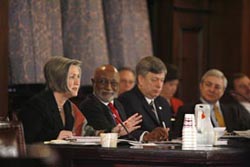President Hart makes the case for Temple support
 Photo by Joseph V. Labolito / Temple University
President Ann Weaver Hart was joined by (from left) Lincoln University President Ivory V. Nelson, University of Pittsburgh Chancellor Mark A. Nordenberg and Pennsylvania State University President Graham Spanier as the four educators appeared before the State House and Senate Appropriations Committees on Feb. 27 in Harrisburg.
|
Gov. Edward G. Rendell has proposed increasing state funding for Temple to $187 million, a 2 percent increase over last year. In its budget request, the university has asked for $195 million, or a 6.1 percent increase, to meet Temple’s critical needs. In prepared remarks to be delivered to both the state House and Senate appropriation committees on Feb. 27, President Ann Weaver Hart said the state’s commitment is a vital factor in keeping Temple’s momentum moving forward. “We strive to fulfill our mission to provide access to superior education for academically talented and highly motivated students without regard to their status or station in life,” the president told the legislators. |
|
“We are deeply committed to our North Philadelphia neighborhood and are an active participant in Southeastern Pennsylvania’s efforts to secure economic vitality and a bright future for our region. We cannot do any of this without your support.” Among the issues prominent in the president’s prepared presentation was the positive impact Temple has in the greater Philadelphia region. For example, more than half of Temple’s 240,000 alumni live and work in the area. And two-thirds of Temple’s entering class last fall said they want to stay in Philadelphia when they graduate. At the same time, the university’s increasingly residential nature is influencing the surrounding community, with more than $200 million in private investment coming in to North Philadelphia since 2002. But challenges remain. “Temple is committed to putting the opportunity of a great education within reach of students at every income level. The university focuses on maintaining affordability and containing tuition increases, and dedicates substantial funding to financial aid each year,” Hart said. “However, Temple serves a population in which an exceptional number of families demonstrate financial need.” More than two-thirds of Temple undergraduates need financial aid. And while grants and loans to students are on the rise, the unmet need continues. While the commonwealth’s contribution has helped, the state lags in supporting higher education when compared with others in the nation. “The most recent measures place Pennsylvania 45th nationally, 30 percent below the national average in its funding of higher education,” Harts pointed out. “Low levels of public support equal higher tuition” and can have “tragic consequences” for the state’s future workforce, she said. Hart stressed that investing in Temple ensures that the university will be able to continue providing superior education for committed and capable students of all backgrounds and to provide the region and the state with a skilled and educated workforce. |
|